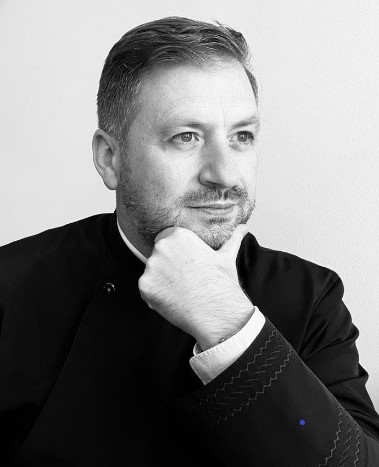
Orthodox priest, a man of quests that stir the human spirit, husband, father, and a man grateful to God for everything.
Born in Târgu Mureș, where he still operates to this day, he is the author of a doctoral thesis entitled Byzantine Morning – historical, liturgical, and theological study, having obtained the title of Doctor of Liturgical Theology at the “Andrei Șaguna” Faculty of Orthodox Theology of the “Lucian Blaga” University in Sibiu (2010).
He studied at the Faculty of Orthodox Theology in Alba Iulia (1997-2001) and performed several research and documentation internships at The En Calcat Benedictine Monastery in France (1999), the Faculty of Theology in Athens (2005) and the Pontifical Oriental Institute in Rome (2007).
He conducted his master’s studies in Integrative Psychotherapy at the Romanian Association of Integrative Psychotherapy Bucharest, a Romanian-British training program (2018-2020).
DOING FOR BEING. LEGITIMIZING RELIGIOUS EDUCATION WITHIN THE REALM OF ARTIFICIAL INTELLIGENCE
Ontologically speaking, man is a religious being. The concept of Homo religiosus, often debated and praised in postmodern times, goes beyond the usual patterns of life. It encourages us to have faith in the existence of an absolute Reality and Person, known as sacred. This Reality has both a transcendent and immanent aspect, and the Person is referred to as God. Moreover, Religion, far from being an opiate for the masses, a hindrance to human civilization, or even a betrayal of science and culture through the encouragement of obscurantism, bigotry, and superficiality sustained by superstition – Religion, therefore, also reveals a transcendent meaning of life and man, supporting this anthropos (sky-viewer) not to remain a mere acultural or subcultural gazer towards an indefinite horizon or zenith. On the contrary, man can understand, beyond dilemmas, denials, suspicions, skepticism, and prejudices, that a religious education claims its legitimacy from within and not from without. Is religion still relevant in today’s world and should it be a part of our daily routine? Can we substitute the unknown and spiritual with the virtual realm of the metaverse? Why bother with the advice that dedication and effort are necessary for success when a simple like can bring us recognition and promotion, even without true commitment? Are we at war with the digital age, with artificial intelligence, or with a mindset that rejects creating connections between the virtual and the real world? Who is today’s educator? The teacher, the priest, the parents, or the Chat GPT? Is there any reason why we shouldn’t place our bets on a strong and balanced partnership that satisfies our need for spirituality, knowledge, and technology? The answers we provide in this study are not exhaustive or judgmental, but rather merely possibilities.
